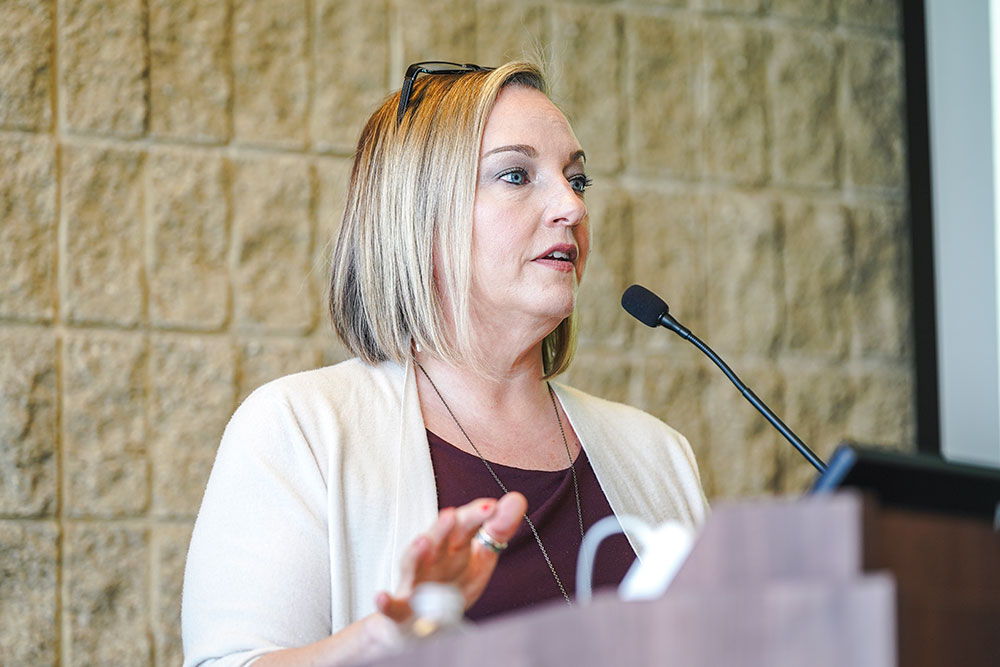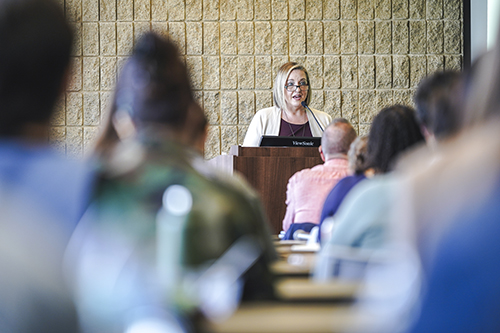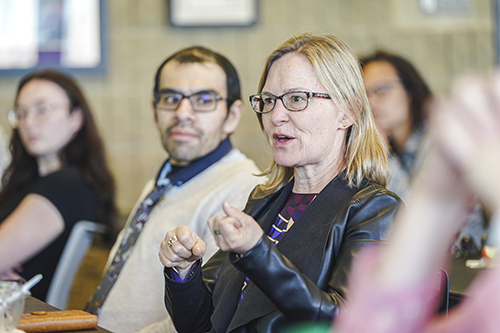Homecoming for a Housing Researcher
Alum Stefanie DeLuca returns to Northwestern as IPR’s inaugural visiting scholar
Get all our news
You have to be brave to do work that’s going to make somebody mad, because good work always will.”
Stefanie DeLuca
Johns Hopkins sociologist and IPR visiting scholar

During an IPR colloquium on May 12, Stefanie DeLuca shares findings from her research about a housing mobility program and how her work has informed housing policy.
In Stefanie DeLuca’s first week as a graduate student at Northwestern in 1997, she heard something that floored her.
At an orientation for her PhD program, IPR education researcher Jim Rosenbaum presented his recent research on the groundbreaking Gautreaux Assisted Housing Program.
Launched in 1976 as a result of a 1966 class-action lawsuit, the desegregation initiative enabled 7,100 Black families to leave public housing in Chicago—one of the most segregated cities in America—and move to affluent, mostly White suburbs with high-performing schools.
“I came up to him afterwards, as a student from the South Side of Chicago, for whom the color line was quite obvious,” DeLuca recalled in a May 12 IPR colloquium during her visit.
“I said to Jim, ‘How did they pull this off? How did they manage to break the color line and give Black families a chance to move to neighborhoods that they’d otherwise been denied because of race?” she recalled. “I just think it’s amazing the civil rights advocates were able to pull this off, and you were able to study it.’”
“He looked at me, and he said, ‘Do you want a job?’”
For DeLuca, that conversation marked the beginning of a research journey that took her from Northwestern to Johns Hopkins University and back again, as IPR’s first visiting scholar.
Kicking Off IPR’s Visiting Scholars Program
From May 12–16, DeLuca met with IPR faculty and students, shared her latest research, and discussed how to effectively communicate research findings to policymakers.
Her visit kicked off IPR’s Visiting Scholars Program, which brings distinguished researchers to campus who work on pressing social policy issues and have a proven track record of public engagement.

Stefanie DeLuca explains how her time working with IPR
scholars informed her research agenda.
“IPR’s Visiting Scholars Program is an exciting step toward expanding our footprint, opening collaborations with outstanding scholars from other institutions, providing our community with learning opportunities from the best policy researchers in the nation, and fostering long-lasting connections,” said IPR Director and sociologist Andrew Papachristos.
Now a professor of sociology at Johns Hopkins, DeLuca is one of the nation’s leading experts on housing mobility, housing vouchers, and policy design. As director of the Poverty and Inequality Research Lab and a research principal at Harvard’s Opportunity Insights, she collaborates extensively and prioritizes policy outreach. In October 2024, for instance, she shared evidence from her research at an IPR Policy Research Briefing on Capitol Hill that provided lessons on how to give low-income families access to better neighborhoods and improve their lives.
DeLuca earned her PhD from the School of Education and Social Policy’s Human Development and Social Policy program in 2002. As a graduate student, she worked with Rosenbaum and then-IPR economist Greg Duncan on influential studies of the Gautreaux and Moving to Opportunity (MTO) housing programs.
‘You Learn by Talking to People’
She focused her colloquium on Creating Moves To Opportunity (CMTO), a Seattle housing mobility program that built on MTO and surpassed its success. In the CMTO experiment conducted with Raj Chetty and colleagues at Opportunity Insights, DeLuca found that just 15% of voucher-holding families in the control group relocated to places linked to upward mobility—but in the CMTO treatment group, that figure was over 50%.
DeLuca highlighted how emotional and logistical support from housing “navigators” made searching for a home easier for low-income families, who experience a range of stressors. Forty percent of participants reported a history of abuse or other trauma, and 75% had experienced a bout of homelessness, underscoring the need for tailored support.
“Moving is hard even with money. It’s really hard without money,” she said.
A key feature of her research is its mixed-methods approach: combining quantitative data with in-depth qualitative data collected through interviews with families.
“Where I’m from, on the South Side, you learn by talking to people,” DeLuca said.
She elaborated on the value of qualitative methods: “Narrative interviewing, it does a couple of things. The first thing it does is it disquiets unfounded assumptions that you might have held onto too long, and gives you a chance to think bigger, because you’re not limited by your own imagination and experience.”

IPR fellow Emma Adam asks DeLuca a question during the Q&A.
Policy scholars, DeLuca explained, often assume that lack of information or financial resources are the main barriers to moves among poor voucher holders. But by listening to people’s stories, DeLuca and her team uncovered a surprising truth: Other housing search hurdles were getting in the way and customized support from housing navigators made the critical difference.
Interviews also revealed a disconnect between policymakers’ framing of “choice” and the lived experiences of low-income families trying to secure housing.
“My earlier work showed that, rather than making deliberate decisions about when to move, let alone where to move, most of the poor families that I talked to in six different cities moved reactively,” DeLuca said.
“We started out in Alabama asking people, ‘How did you pick this neighborhood?’ And instead, in these interviews, what people told us is how they ended up living in the place they were because of what happened at the place that they were bounced out of, for various reasons: housing quality, neighborhood violence, landlords going broke, domestic violence and so on,” she continued.
Moving under these circumstances, families would take the housing they could get, often in high-poverty, high-crime areas. DeLuca and her collaborators in the CMTO study were heartened to see that with the right supports, more poor children could grow up in neighborhoods that research has shown will improve their long-term economic mobility.
‘Be Brave’: Good Work Will Always Make Someone Mad
DeLuca related how her findings have gone on to inform federal legislation aimed at improving and expanding housing voucher programs. A bill spearheaded by then-Wisconsin Reps. Paul Ryan and Sean Duffy allocated up to $70 million to expand support services for families using housing vouchers—an idea grounded in barriers identified in DeLuca’s research. During the first Trump administration, DeLuca advised then-Secretary of Housing and Urban Development Ben Carson in the hopes of securing HUD support for scaling CMTO nationally with bipartisan funds from the Ryan-Duffy bill. Housing mobility programs like CMTO have since been launched with this funding in eight additional cities. DeLuca sees ample opportunity as well for change on the state and local levels, having briefed legislatures in Oregon, Connecticut, and Maryland.
To scholars looking to make an impact, DeLuca advised, “You have to be brave to do work that’s going to make somebody mad, because good work always will.”
During her visit, DeLuca met with more than a dozen IPR faculty members from disciplines including sociology, economics, and political science—as well as a group of IPR graduate student research assistants, just starting down their research pathways at Northwestern as DeLuca once did.
“What stood out to me from Stefanie’s remarks was her insightful reframing of indecisiveness as a strength, highlighting how openness to multiple paths can lead to greater growth and success,” said Michael Armah, a PhD student in statistics and IPR graduate research assistant. “This perspective resonated with me, as my research focus often feels pulled in several different directions.”
DeLuca reflected on her visit: “It was energizing and inspiring to find that the impact and innovation that characterized the IPR I remember not only remain, but have grown exponentially since. The scholars and policy science here are deep and as cutting-edge as ever.”
DeLuca’s visit offered not just a homecoming, but a launch: for a new IPR program, new collaborations, and new ways to engage with research that has real-world impact.
Photo credit: Jonah Elkowitz
Stefanie DeLuca is the James Coleman Professor of Sociology and Social Policy and director of the Poverty and Inequality Research Lab at Johns Hopkins University. Andrew Papachristos is the John G. Searle Professor of Sociology, IPR director, and director of the Center for Neighborhood Engaged Research & Science (CORNERS).
About IPR’s Visiting Scholars Program
The Visiting Scholars Program brings exceptional researchers to Northwestern who excel in science outreach, fostering collaboration and intellectual exchange with IPR faculty and students. For more information about the program and our inaugural visiting scholar Stefanie DeLuca, visit our program webpage.
Published: June 23, 2025.


